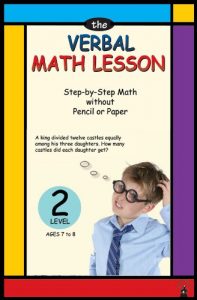This course is designed to make math fun for your young child. As in learning to read, where children need to develop a basic vocabulary for fluency, the verbal problems in this course also build a basic mathematical vocabulary that your child needs to progress further. Similar to our step‑by‑step reading program, the Reading Lesson, the Verbal Math Lesson strengthens the ability to do math quickly.
Written math makes simple arithmetic tedious for young children, particularly for those who don’t like to write. Often, an insistence on worksheets that require more writing effort than math leads to a dislike for math in general. We want your child to like math, and learning math as a game helps this process.
This book is intended for children in grades 1-2.
The problems must be read to the child, so all calculations are done mentally and without the use of pencil or paper.
Written math makes simple arithmetic tedious for young children, particularly for those who don’t like to write. Often, an insistence on worksheets that require more writing effort than math leads to a dislike for math in general. We want your child to like math, and learning math as a game helps this process.
This book is intended for children in grades 1-2.
The problems must be read to the child, so all calculations are done mentally and without the use of pencil or paper.






